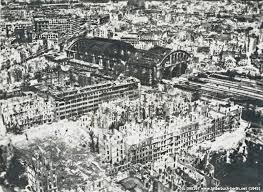Which Way the Trolley: America’s Hot Wars During the Cold War, Part 1

Berlin in ruins.
The Royal Air Force was responsible for most of German civilian casualties of the war.[15] The American Air Corp in Europe attempted to avoid bombing civilian areas directly and tried, with its famous Norden bomb sight, to target war production facilities or railheads. But the bomb sights were, in fact, very difficult to use properly, and the American bombing campaign resulted in many unintended civilian deaths.[16]
Yet, throughout the war there were many instances of American airmen attempting to avoid unnecessary civilian deaths. One such instance was related to me by an Anglican priest, Fr. Muntean (1924-2013) who was a navigator and assistant bombardier on B-24s, and was on 30 missions in and out of Hitler’s “fortress Europe.”[17] Just after D-day his squadron was on a mission to destroy a Nazi fuel depot in Paris. There was cloud cover over the target as they reached the bomb release point, and the commander ordered the planes to go around for another attempt, and thus avoid French civilian casualties. On the second attempt there were more clouds, and he ordered another go-round. In the meantime, the German anti-aircraft gunners, knowing the exact approach and altitude of the bombers, shot down two bombers (ten crew members each). As he related this story he remarked that had the squadron been over a German site they probably would have guessed and let the bombs go on the first run. But the incident demonstrates that sometimes the American airmen tried to keep civilian casualties down, even with heroic measures.[18]
Ironically, post-War intelligence studies showed that the War could have been won at least a year earlier than it was if the Allies had bombed the German electric grid and fuel production facilities – its industries would have been totally paralyzed.
To use the trolley parable, Churchill, Roosevelt, and their air force generals had pulled the lever to the left, knowing they would kill many for the sake of saving many more, and prevent the enslavement of the world under Nazi tyranny and the execution of its genocidal goals.[19] We now know for a fact that the defeat of Nazi Germany, although was too late to save European Jewry, prevented the enslavement and destruction of the Polish and other Slavic nations.[20] The Japanese Empire, though not specifically racist or genocidal, acted with almost equally barbarous treatment of civilians in the territory it conquered, as any Chinese or Korean would relate even to this day.[21]
But this is not to say that the Allied leaders were morally guiltless. The least that can be said is they did not try hard enough to find other tactics to employ their air forces. In fact, Winston Churchill believed that the punishing air campaign against Germans civilians was necessary to dissuade any future ambitions towards global conquest.[22] He had lived through Germany’s surrender in 1918 and its subsequent rearmament and new aggressions under the Nazis regime. He did not want a “threepeat.” In 1944 the Archbishop of Canterbury, the Church of England’s highest prelate, pleaded with Churchill to stop the bombing of German cities and negotiate for Germany’s surrender on less than total terms, but Churchill rebuffed that appeal.[23]
Category: Church History, Fall 2016


